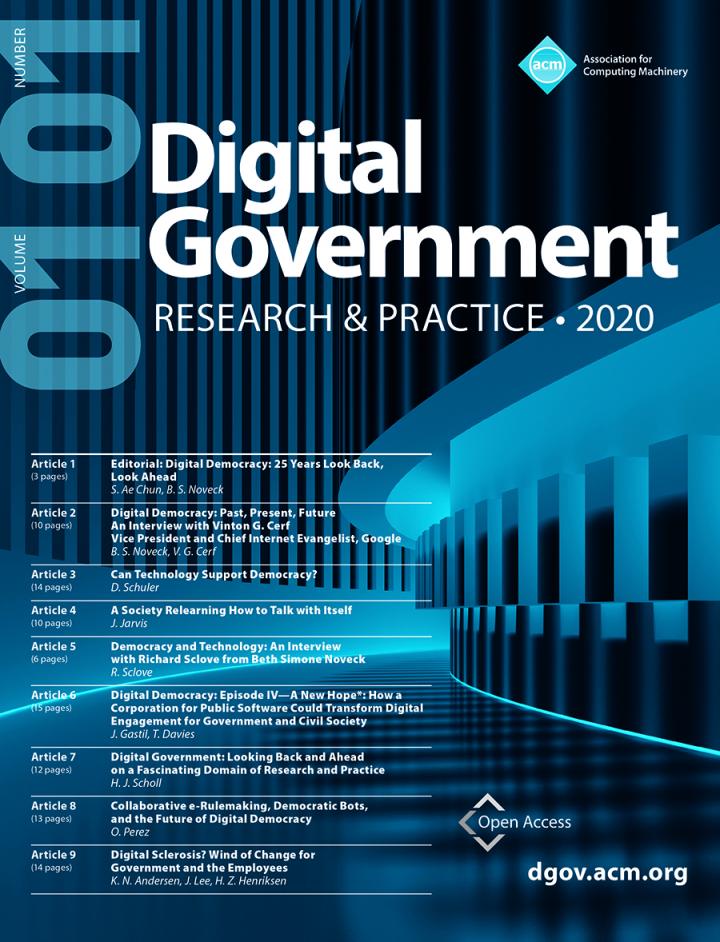In inaugural issue, pioneers look at the development and future of digital democracy

Credit: Association for Computing Machinery
ACM, the Association for Computing Machinery, today announced the inaugural issue of Digital Government: Research and Practice (DGOV), a new interdisciplinary open access journal on the impact of technology on governance and public institutions. DGOV presents applied and empirical research from academics, practitioners, designers and technologists, using political, policy, social, computer and data science methodologies.
The inaugural issue of Digital Government: Research and Practice examines the state of digital democracy, featuring a selection of articles from pioneers in the field. It also includes an interview with Vint Cerf, recognized as one of the fathers of the internet. Contributors to the first issue of DGOV include Richard Sclove, Douglas Schuler, Jeff Jarvis, John Gastil, Todd Davis, Hans Jochen Scholl, Oren Perez, Kim Andersen, Jungwoo Lee and Helle Henriksen.
“Digital technologies have reshaped how governments function at every level, as well as how citizens interact with government and each other,” said DGOV Co-Editor-in-Chief Soon Ae Chun of the City University of New York. “We emphasize research and practice in our title because we felt there was a void among publications in the government informatics field geared toward practitioners. We hope Digital Government: Research and Practice will be a venue where people from around the world will share their best practices and latest innovations.”
The target audience for the new journal includes academics, researchers, data science practitioners, students, government officials and policymakers, businesses that work with governments, journalists, legal experts, teachers, librarians, and individual citizens and advocacy groups. The methodologies of these researchers are often as diverse as expected from different disciplines, ranging from highly technical and scientific rigors to empirical social scientific methods to highly creative approaches.
“In a highly interconnected society where online, mobile and physical interactions generate big data issues, government organizations face tremendous challenges in terms of discovering the right information to formulate the best policies and services,” added DGOV Co-Editor-in-Chief Beth Simone Noveck of The Governance Lab at New York University Tandon School of Engineering. “Through a rigorous peer review process and an emphasis on interdisciplinary approaches, we plan to make Digital Government: Research and Practice an essential resource for those working to enhance the functioning, decision making and planning capabilities for governments and citizens in our technology-driven world.”
“DGOV will be available in digital format and will be fully open access,” added ACM Director of Publications Scott Delman. “Our overarching goal is to foster a cross-pollination of ideas among the many distinct disciplines which contribute to government informatics. We envision the new journal as a global repository, where insights and practices can be unveiled, tested and refined. In this spirit, we hope professionals at all levels will read DGOV regularly and consider contributing to it.”
DGOV will implement double-blind review: neither the reviewer nor the submitter will be informed of each other’s identities. The DGOV editorial board encourages authors to support the validity of findings and conclusions, while also welcoming experimental data, observational data, or prototype systems to enhance transparency of studies. Papers that have been selected for major conferences, such as meetings organized by the Digital Government Society in North America and the IFIP E-Gov community, can be fast-tracked for the DGOV journal.
In addition to Co-Editors-in-Chief Chun and Noveck, the DGOV editorial board includes Information Director Fazel Keshtkar of St. John’s University, 13 Associate Editors and 33 review board members representing various countries including Austria, Brazil, Canada, Denmark, Germany, Greece, India, Ireland, Israel, Mexico, South Korea, Turkey, the United Kingdom, and the United States.
###
About ACM
ACM, the Association for Computing Machinery, is the world’s largest educational and scientific computing society, uniting computing educators, researchers and professionals to inspire dialogue, share resources and address the field’s challenges. ACM strengthens the computing profession’s collective voice through strong leadership, promotion of the highest standards, and recognition of technical excellence. ACM supports the professional growth of its members by providing opportunities for life-long learning, career development, and professional networking.
About The Governance Lab (The GovLab) at NYU Tandon School of Engineering
The Governance Lab’s mission is to improve people’s lives by changing the way we govern. Our goal at The GovLab is to strengthen the ability of institutions — including but not limited to governments–and people to work more openly, collaboratively, effectively, and legitimately to make better decisions and solve public problems. We believe that increased availability and use of data, new ways to leverage the capacity, intelligence, and expertise of people in the problem-solving process, combined with new advances in technology and science, can transform governance. We approach each challenge and opportunity in an interdisciplinary, collaborative way, irrespective of the problem, sector, geography, and level of government. For more information, visit thegovlab.org.
Media Contact
Jim Ormond
[email protected]
212-626-0505




